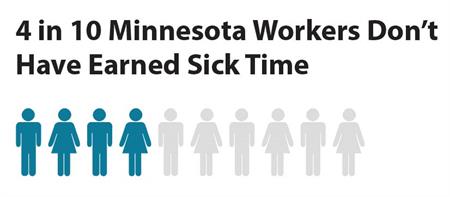Hard-working Minnesotans should not lose wages or their jobs when they take time off to care for themselves or a sick family member, or deal with domestic abuse. But currently, 1.1 million Minnesotans, or 41 percent of the state’s workforce, face this situation because their jobs do not offer earned sick leave.[1] These workers live all across the state, and in some counties, including Stearns and St. Louis, about half of all workers lack access to earned sick leave.[2]

Expanding access to earned sick time would allow workers to care for themselves and their families when illness strikes. Families with access to paid sick leave also are able to make medical appointments at regular office hours instead of having to wait for after work hours when they may need to use more expensive emergency services.
Earned sick leave is good for workers and for our state’s economy by giving us a more productive and stable workforce.
Earned Sick Leave Especially Benefits Workers Who Have Been Left Behind in the Economy
For many workers, one or two days of lost wages can mean difficulty paying the rent, or their family’s transportation or child care costs. But with earned sick leave, workers keep their jobs and pay.
Expanded earned sick leave would especially reach those who can least afford to lose wages, including low-income workers and people of color. While 41 percent of workers in Minnesota lack earned sick leave, the situation is more pronounced among communities of color. Almost half of black workers and 60 percent of Hispanic workers do not have earned sick leave. Expanding access to earned sick leave would also significantly help people with low incomes: 66 percent of Minnesota workers earning less than $15,000 a year lack earned sick leave.
Paid Sick Leave is Good for the Economy
Expanding sick leave would be good for Minnesota’s workers and employers. With earned sick leave, workers are able to take time off when they need to without losing earnings, and employers have a healthier workforce and may reduce costs. Earned sick leave can:
- Reduce turnover, which gives employers more stability in their staff and lowers costs by reducing the need to attract and train new employees.[3]
- Lead to healthier and more productive workers. Without sick leave, workers often come in sick and are not able to perform their job duties as well. Without proper care, they may become more ill, requiring increased recuperation time. Giving workers a day to recover or seek medical attention means that workers can come back to their jobs sooner, ready and able to work. And in fact, workers with earned sick days only take one more day off per year on average than those without them.[4]
- Contribute to healthier workplaces. When sick workers can stay home and take care of themselves, that keeps coworkers and customers healthier.
Reduced turnover, more productive workers and healthier workplaces are all good for businesses’ bottom lines.
Policymakers Should Make Greater Access to Earned Sick Leave a Reality
It’s time to give Minnesota workers greater job security and peace of mind, instead of distress over choosing between a sick child or their wages.
Policymakers missed an important opportunity in the 2015 Legislative Session. Bills introduced in the Minnesota Senate and House would have expanded sick leave to more Minnesota workers.[5] Through these bills, after about four months on the job, workers at large employers would earn up to nine days of paid leave per year, while those at small employers would earn up to five days each year. Employers could allow their employees to accrue more sick days than these requirements. Policymakers should return to the Capitol next year ready to increase access to earned sick leave.
By Clark Biegler
[1] Institute for Women’s Policy Research, Access to Paid Sick Time in Minnesota, September 2014.
[2] Institute for Women’s Policy Research, Paid Sick Time Access in Minnesota Varies by County of Residence, September 2014.
[3] National Partnership for Women and Families, Paid Sick Days: Good for Business, Good for Workers, August 2012.
[4] National Partnership for Women and Families, Everyone Gets Sick. Not Everyone Has Time To Get Better, April 2010.
[5] Senate File 481 and House File 549 would have expanded earned sick leave for Minnesota workers.